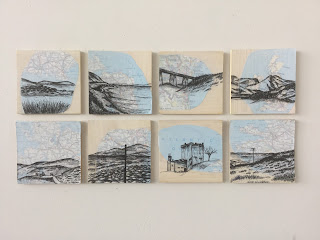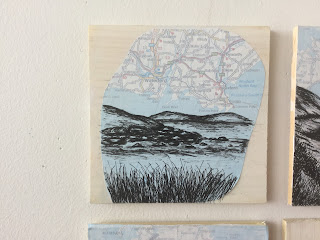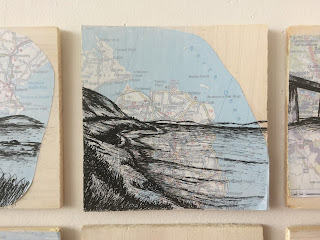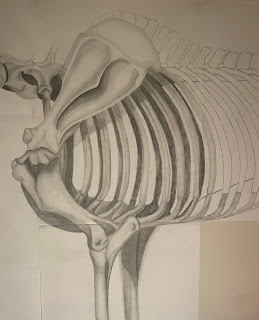As mentioned in class Assignment 4 can be an extension of ideas for assignment 3 (time-based drawing) or a completely different project that connects traditional drawing materials with contemporary ideas.
As indicated on UM Learn in the course syllabus, assignment 4 will involve the following ideas:
"Assignment 4 from Course Syllabus:
Thematic Content, Contemporary Ideas and Drawing:
This assignment will offer choices that require the student to address a culmination of ideas disseminated from this course.
Objectives of Assignment:
The following project requires synthesizing formal and conceptual thematic content in relation to contemporary art [and drawing]. The research and the final outcome of the project should demonstrate a curiosity and an awareness of contemporary ideas. [check the optional reading list such as the Vitamin D book in the syllabus and links from assignment 4 to assist you further in your research]
Ultimately these contemporary ideas should be crafted technically and conceptually into a work of innovative contemporary art."
Contemporary ideas can include some of the optional themes presented in assignment 3, but could include other ideas as well. Majority of the work presented in previous assignment’s group discussions were different examples of drawing connecting to contemporary ideas and contemporary drawing processes.
Generally speaking contemporary ideas should have layers of meaning and the work should have an overall synthesis of formal and conceptual (thematic) ideas.
Students should periodically consult instructor throughout the process of the project to ensure that enough work is done and objectives of final project are addressed. As well there should be an in class dialogue with class peers regarding work. (As usual positive in class participation is expected).
Potential Options for Assignment 4:
The following assignments are suggestions (options) meant to serve as a guide. This list is not inclusive. You may wish to work on one assignment or combine ideas of various assignments. See options/assignments1-6 listed below.
1) Make a drawing on something 3Dimensional. Work may also include the use of non-traditional surface(s)/materials for applying drawing mediums onto. For example: metal, wood, fabric, resin, glass, and collaged newspapers and surfaces that are not oblong in shape. Or mixing paint and material together such as wax, silicon, plaster, or powders (Remember to think of art materials and health hazard issues with some materials)
Work can also include the interaction of the original colour of a selected material with other coloured surface(s)/materials or the occasional coloured object may be placed on a coloured surface. 20% of time should be spent on 3D component and 80% should be spent on the execution of the drawing. It is suggested that this option be chosen only if the person has aptitude and tools for making 3D work.
2) Develop collage in a drawing and/ or use of text or create a new type of bookwork as long as an innovative language of drawing is demonstrated. Consider book to be innovative with visual metaphorical layers of meaning.
3) Drawing in relation to a technology of choice: film, video, digital imaging (computers), cyber space, sound, photography, photocopying, printmaking, and/or a drawing project that addresses issues concerning media and culture.
4) Drawing that is process based, or time based, or performance based. (expanded new interpretation of assignment 3)
5) You may have part of your drawing allude to a cultural critique addressing an issue or a combination of issues such as: economic class, power, gender, sexuality, environment or race.
6) Open Project (Expand definition of Drawing in relation to Experimental and Innovative Contemporary Art Practices)
Work can also include the interaction of the original colour of a selected material with other coloured surface(s)/materials or the occasional coloured object may be placed on a coloured surface. 20% of time should be spent on 3D component and 80% should be spent on the execution of the drawing. It is suggested that this option be chosen only if the person has aptitude and tools for making 3D work.
2) Develop collage in a drawing and/ or use of text or create a new type of bookwork as long as an innovative language of drawing is demonstrated. Consider book to be innovative with visual metaphorical layers of meaning.
3) Drawing in relation to a technology of choice: film, video, digital imaging (computers), cyber space, sound, photography, photocopying, printmaking, and/or a drawing project that addresses issues concerning media and culture.
4) Drawing that is process based, or time based, or performance based. (expanded new interpretation of assignment 3)
5) You may have part of your drawing allude to a cultural critique addressing an issue or a combination of issues such as: economic class, power, gender, sexuality, environment or race.
6) Open Project (Expand definition of Drawing in relation to Experimental and Innovative Contemporary Art Practices)
Overall this assignment should have traditional drawing materials and or processes (dry drawing materials such as pastels, conte, vine charcoal, etc) in some way. However wet mediums such as water colour and other materials (including non-traditional drawing materials) may be used in conjunction with traditional drawing materials. As always if clarification is required as to what materials can be used for assignment contact instructor.
As in previous course assignments prepare yourself with a large variety of potential images and materials to work from, and mentally prepare yourself for risk taking, reworking, re-editing, researching, applying criticism and generally experimenting with conviction, and also have materials available for any small preliminary works and you will have a very successful work or series. Allow substantial time for "risk taking, reworking, re-editing, researching, applying criticism and generally experimenting with conviction".
As in previous course assignments prepare yourself with a large variety of potential images and materials to work from, and mentally prepare yourself for risk taking, reworking, re-editing, researching, applying criticism and generally experimenting with conviction, and also have materials available for any small preliminary works and you will have a very successful work or series. Allow substantial time for "risk taking, reworking, re-editing, researching, applying criticism and generally experimenting with conviction".
Student examples of assignments presented below are suggestions meant to serve as a guide. These examples below are not inclusive (the assignment outcome can be very different from the examples below). When considering option 1-6 (listed above) you may wish to work on one assignment or combine ideas of various assignments. Student examples of some final projects from previous first year drawing courses :
Mixed Media (ink washes on vellum with textile work)
2018
(with details below)
Untitled (Travels Journals)
Mixed Media (ink on maps mounted on painted wood)
2018 (with details below)
Stop Motion Animation involving traditional drawing materials:
https://www.youtube.com/watch?v=LjATJUAqrWg&list=PLsQTJKGSZF8_AxSDOfPKPuyiylrY1ZwzI&index=1
Drawing Studio 2 Winter 2011
Drawing Studio 2 Winter 2011
Evaluation/Grading Breakdown for Final Assignment
Unless otherwise indicated* each assignment will be broken down in terms of the following:
Layers of Concepts/Themes 20%
Formal/Visual Language/Technical Skill 75%
Synthesis of the concepts/intention with formal/visual language 5%































No comments:
Post a Comment